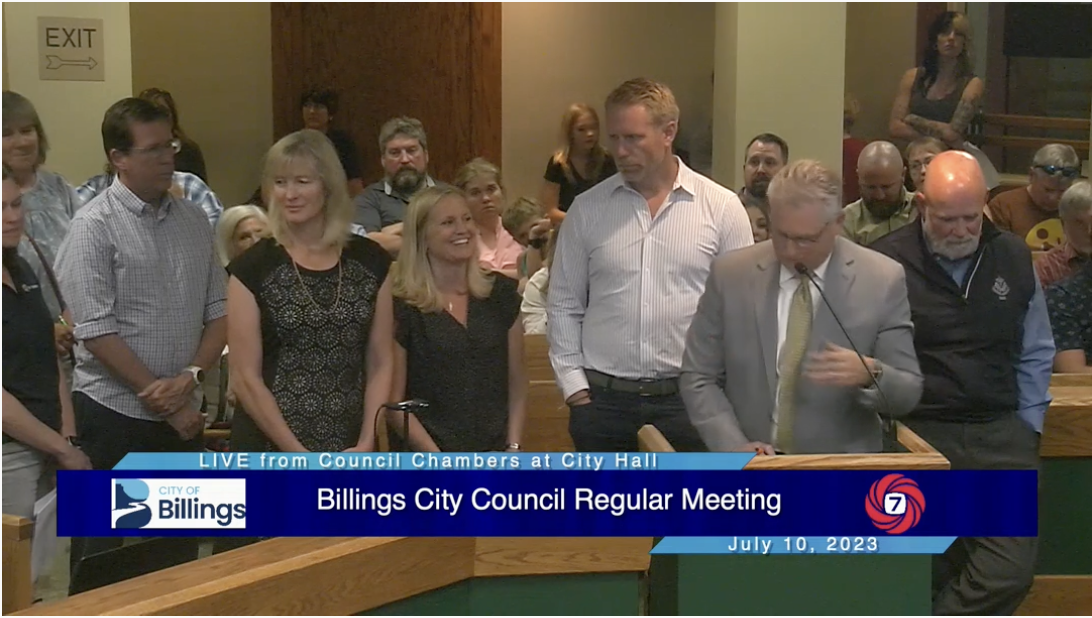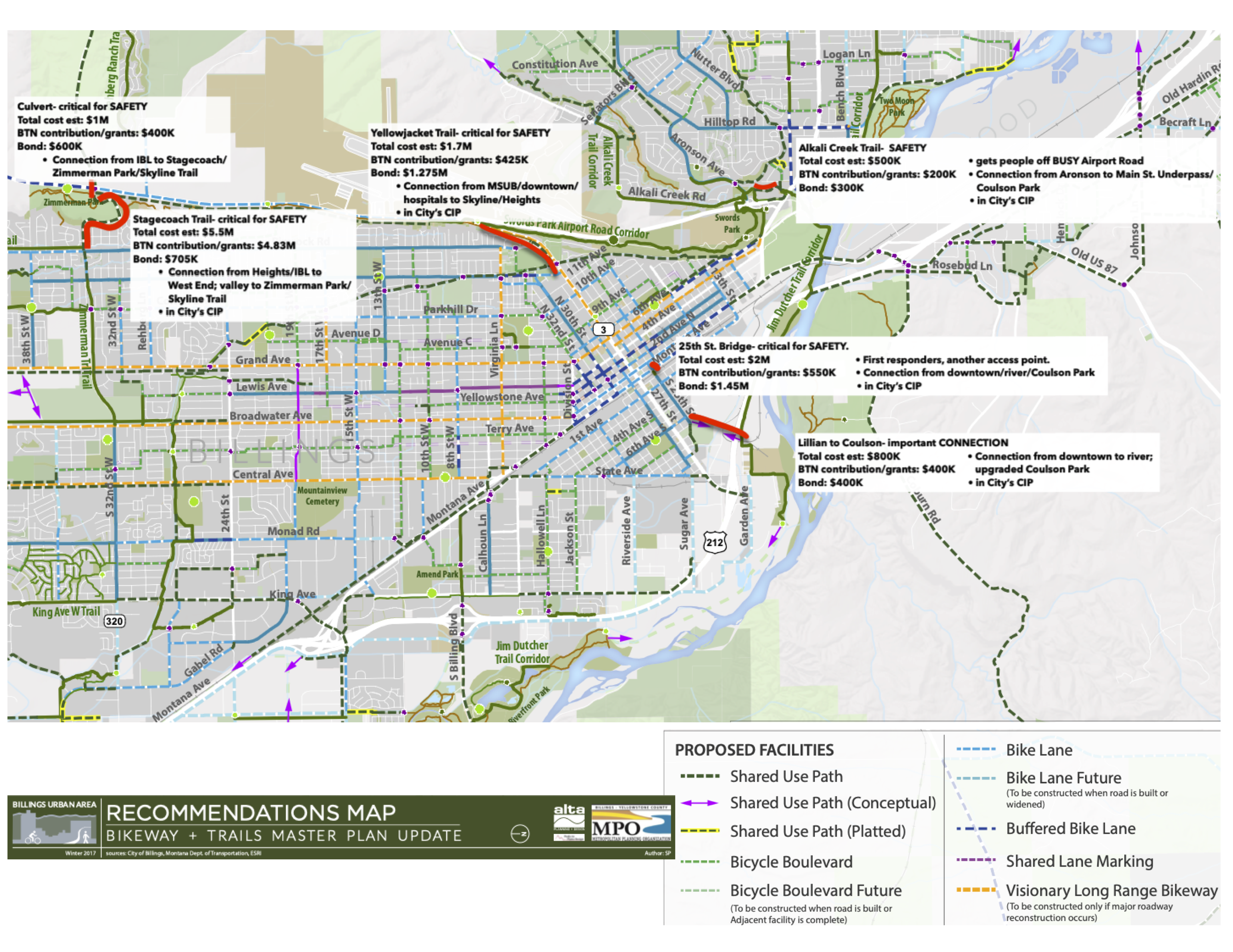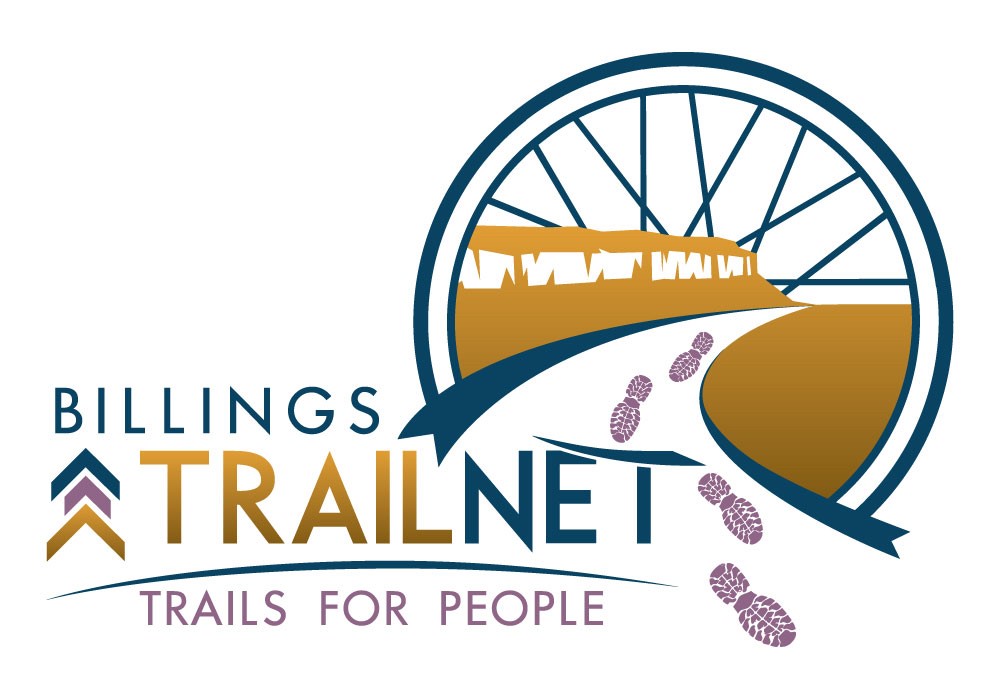On Monday, July 10, 2023, Billings City Council voted to give its citizens a chance to tax themselves to develop and repair parks, trails and a recreation center.
Their vote came after much deliberation, counter motions and consideration by a group of trail, parks, and recreation

advocates consisting of Partners for Parks, Chamber of Commerce, TBID, Big Sky Economic Development and Billings TrailNet, whom acknowledged the magnitude of this issue during the public comment period: “This is a big decision,” said Big Sky Economic Development Director, Steve Arveschoug on behalf of the group. “It’s important for our community and it’s weighing on you, I see that,” he said.
Trail projects included in the package presented to City Council for the bond amount to just over $6 million. They make important connections and provide critical safety routes for bicyclists, pedestrians and people using wheelchairs. They are pictured and described below:
- a culvert under Highway 3 to connect the Inner Belt Loop trail from the north to the south side of the highway where it intersects at the roundabout (this will enable people to cross Highway 3 at the roundabout without dashing across this high-speed highway)
- the Stagecoach Trail adjacent to Zimmerman Trail (this will allow bicyclists and pedestrians a way to get from Rimrock Road to the rims, to Zimmerman Park, the Skyline Trail, the Inner Belt Loop Trail and ultimately, the Heights, and get them off Zimmerman Trail)
- the Yellowjacket Trail next to 27th St. between Rimrock Road and the airport roundabout (this will give people safe access between the Heights/the rims and Billings’ downtown)
- a trail connector from the Alkali Creek Trail to the Main Street Underpass (this will give people safe access between the end of the Alkali Creek Trail to the rest of the trail network, rather than riding opposite traffic on the sidewalk next to busy Airport Road)
- a pedestrian bridge over the railroad tracks at 25th St. and Montana Ave. (this will provide safe access from downtown over the railroad tracks and will provide an important connection to the Yellowstone River)
- a trail connector between south 25th St. and Coulson Park, under the I90 overpass (this will provide the rest of the access in #5 to the Yellowstone River and Coulson Park from downtown Billings)
- city-wide directional signage on the trail network (this will give both residents and tourists much-needed information about how and where to get to the next trail and common destinations)
Each of these projects is eligible for approximately $2 million in grant funding and just needs a community match. Billings TrailNet has committed $425,000 to the entire package, so taxpayers would contribute about $4 million to complete all of the projects.

Other projects included in this package include:
- Castle Rock Park
- Centennial Park
- Cottonwood Park
- Coulson Park
- Poly Vista Park
- Recreation Center
- South Park Pool Renovation
- Water Reservoir
- North Park and Zimmerman Centers
City Council member Kendra Shaw wrote a thoughful recap of this issue in her recent Facebook post, explaining Billings’ unique funding constraints for capital projects.
“The city does not have funding for major capital investments for parks or new parks development – it never has. The entire parks budget for the city year-round is about $10 million. Rebuilding South Pool will cost about $10 million – I’m sure you can see how it’s impossible to find funding for major investments like this within the yearly parks budget, and South Pool is just one example. Adding to the parks budget to cover such substantial improvements requires making cuts from other essential services, like public safety, and that’s not likely to happen.
For context, most city departments are separated into what are called “enterprise funds” – their budgets come from user fees and other sources, not local taxes. Public Works is a good example. Residents pay for water usage and garbage pickup as monthly utility fees. Those fees make up the budget for Public Works to buy new trucks as needed, replace water pipes etc. According to Montana law, money collected from water fees can only be used for water services – it cannot be transferred to another department (like parks).
The main exception to this is the city’s general fund, which is funded by local property taxes. From the city’s general fund, approximately 80% a year is transferred directly to public safety (police, fire), another 10% funds parks, and the remaining 10% is city legal, finance, administration, public records, municipal prosecutors etc. Due to Billings’ City Charter, city council cannot raise taxes for general fund services without a public vote. Raising money for major parks capital improvements like South Pool (another recent example from a different department is the new library) – can only happen with a vote of the public,” she explained.
You can view the presentation by Parks Director, Mike Pigg and subsequent discussion and public comment here.
